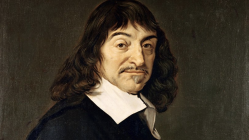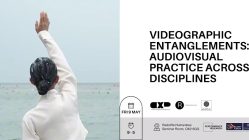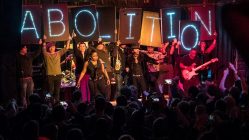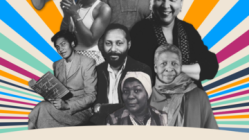Performance Research 24.1: ‘On Song’
Issue Editors: Joan Mills and Ben Spatz
[Performance Research journal website]
Proposal deadline: 12 March 2018
[Download CFP as PDF]
I turquoise-sunray-polish it;
I tzinitzcan-bird-feather-mount it;
I recall the place where song originates.
I zacuan-bird-arrange a good song,
I the singer;
I precious-turquoise-scatter it.
—Cantares Mexicanos, cited and translated by Gary Tomlinson, The Singing of the New World: Indigenous voice in the era of European contact (2007)
Seemingly narrower than related concepts like music and voice, song opens onto specific territories and questions of its own. What is a song? Where do the borders lie between song and music, voice, language, noise, sound, rhythm and melody? What are the powers and forces of song—material and otherwise—and what is it that allows song to so vastly exceed the sum of its constituent parts? Is there an indissoluble link between song and the human, or between song and life?
There is evidence that early human species were able to dance and sing several hundred thousand years before homo sapiens sapiens emerged with the capacity for speech as we now know it.
—John Blacking, A Commonsense View of All Music (1987)
We propose to collect essays and arguments that extend song as concept and as practice. This issue of Performance Research will be richly seeded by thirty years of CPR’s Giving Voice Festival while also looking to chart a radically expanded field of song and songwork. We invite contributions from scholars and practitioners who work with song in unexpected, inventive, critical, passionate ways. We particularly encourage contributions that draw on diverse disciplines and cultures, especially those that have historically been marginalized in performance studies.
Where shriek turns speech turns song—remote from the impossible comfort of origin—lies the trace of our descent.
—Fred Moten, In the Break: The aesthetics of the black radical tradition (2003)
In many performance cultures, song is an integral element of theatre. Since the 1960s, white avant-garde artists like Roy Hart, Jerzy Grotowski, Meredith Monk and Robert Wilson have increasingly used song as an organizing principle for theatrical works. Often drawing upon diasporic and indigenous song traditions, their intercultural projects have provoked important conversations about lineage, authenticity and appropriation. Meanwhile, artists linking tradition to innovation in postcolonial contexts continue to present essential challenges to Eurocentric ontologies of song.
Where are we with song today? How have experimental approaches to vocal performance affected the concept of song and its placement in artistic, cultural and geographic contexts? What can be done with legacy technologies like European musical notation and with colonial concepts like ‘world music’ and ‘traditional’ song? What explains the recent focus on song in popular culture, a globalized phenomenon leading to a raft of media programmes like Glee, Pitch Perfect, The Voice and, most recently, All Together Now? At a time when intellectual property debates are increasingly polarized and chaotic, what are the powers and responsibilities of performers and performance scholars with their particular understandings of embodiment, liveness and mediation?
[S]ongs, as a rule, are not composed simply to be listened to for pleasure. They have work to do, to serve as funeral dirges, as accompaniments to dancing, or to serenade a lover.
—Raymond Firth, Elements of Social Organization (1961)
The following list is only an indication of some of the areas we hope to explore through a focus on song. We welcome contributions that push the form of artistic research and academic publication.
• Forms and typologies of song: aria, lullaby, work song, lamentation
• Song and the sacred: spirituality, breath, chant, mantra
• Song without text, non-lexical song, glossolalia, vocalese
• Song as protest, resistance, anthem, declaration
• Song-based theatres: musical theatre, music theatre, opera
• Song and community, song and commensality
• Song in training, trust, ensemble and team-building
• Song as a phenomenon for neuroscience and cognitive studies
• Fear of singing; issues of confidence and health
• Material limits of song: scream, cry, howl
• Animal song; song and the musicality of the body
• Song and the human/nonhuman/posthuman/inhuman
• Technologies of song: notated score, audio track and beyond
• Singing as improvisation, interaction and emergence
• Song and commerce; intellectual property debates
• Song and ownership; cultural appropriation and authenticity
• Postcolonial and decolonial song
• Song and landscape, geography, heritage, ancestors, memory
• Histories, archaeologies, ontologies and philosophies of song
As for the nightingale’s song, it has always had for me the extra resonance of oratory. It hovers on the edge of speech, of dramatic monologue.
—Richard Mabey, The Book of Nightingales (1997)
Schedule:
Proposals: 12 March 2018
First drafts: June 2018
Final drafts: August 2018
Publication: January 2019
All proposals, submissions and general enquiries should be sent direct to the PR office: info@performance-research.org
Issue-related enquiries should be directed to the issue editors:
Joan Mills (voicemills@gmail.com)
Ben Spatz (b.spatz@hud.ac.uk)
General Guidelines for Submissions:
- Before submitting a proposal, we encourage you to visit our website (www.performance-research.org ) and familiarize yourself with the journal.
- Proposals will be accepted by email (Microsoft Word or Rich Text Format (RTF)). Proposals should not exceed one A4 side.
- Please include your surname in the file name of the document you send.
- Please include the issue title and issue number in the subject line of your email.
- Submission of images and visual material is welcome provided that all attachments do not exceed 5 MB, and there is a maximum of five images.
- Submission of a proposal will be taken to imply that it presents original, unpublished work not under consideration for publication elsewhere.
- If your proposal is accepted, you will be invited to submit an article in first draft by the deadline indicated above. On the final acceptance of a completed article you will be asked to sign an author agreement in order for your work to be published in Performance Research.







